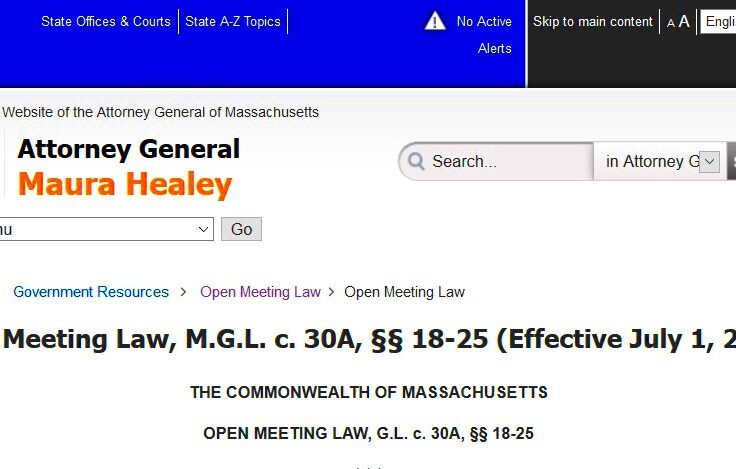Massachusetts Open Meeting Law: Compliance Guidelines
The Massachusetts Open Meeting Law is designed to ensure transparency in government by requiring meetings of public bodies to be conducted openly. This law gives the public the right to attend and observe decision-making processes. Understanding the law is essential for government officials, public organizations, and citizens alike, as it promotes accountability and trust in governance. Failure to comply can result in serious consequences, including penalties.
Key Requirements for Compliance
To comply with the Massachusetts Open Meeting Law, public bodies must follow several key guidelines. These ensure that meetings remain open, transparent, and accessible to the public. Here are the primary requirements:
- Open to the Public: All meetings must be open to the general public unless specific exemptions apply.
- Advance Notice: Public bodies must give adequate notice of their meetings, including the time, location, and topics to be discussed.
- Accurate Minutes: Meeting minutes must be recorded and made available for public access, documenting discussions, votes, and decisions.
- Executive Sessions: These are permitted under certain conditions but must follow strict guidelines for when and how they are conducted.
- Remote Participation: Members can participate remotely, but certain rules must be followed to ensure transparency.
Public Notice and Accessibility
Ensuring public notice and accessibility is critical for compliance with the law. Public bodies are required to post notices in advance, and this notice must meet specific guidelines:
- Timing: Notice must be provided at least 48 hours in advance of the meeting, not including weekends or holidays.
- Details: The notice must include the date, time, and location of the meeting, along with a list of agenda items.
- Physical and Online Posting: Notices must be posted in a public location and, if available, on the public body’s website to ensure easy access.
Accessibility is equally important. Meetings should be held in locations that are accessible to all members of the public, including individuals with disabilities. Additionally, providing remote access to meetings, such as through video conferencing, can further increase public participation and ensure compliance with the law’s accessibility standards.
Executive Sessions: When and How They Are Permissible
While the Massachusetts Open Meeting Law emphasizes transparency, there are situations where public bodies are allowed to meet privately in what is known as an executive session. However, these sessions are only permissible under specific circumstances. Understanding when and how an executive session can be called is crucial for avoiding legal issues and ensuring proper use of this option.
Executive sessions are permitted for the following reasons:
- Personnel Matters: Discussions about an individual’s character, discipline, or job performance can be held in private to protect personal privacy.
- Litigation Strategy: If open discussion might negatively affect the body’s position in a legal case, an executive session can be held.
- Real Estate Transactions: Negotiations regarding the purchase, exchange, or lease of property are permitted to be held in private if public knowledge could harm the negotiation.
- Union and Labor Negotiations: These sessions may address strategies related to labor negotiations or contract discussions.
Before entering an executive session, the public body must first convene in an open session, state the reason for the private meeting, and vote to go into executive session. All votes must be recorded in the minutes, even if taken in the executive session.
Record Keeping and Minutes: What You Need to Know
Record keeping is a key aspect of complying with the Massachusetts Open Meeting Law. Proper documentation helps ensure transparency, as the public has the right to review meeting minutes. Every public body is required to take minutes during both open and executive sessions. Here’s what you need to know:
- Minutes Content: The minutes must include the date, time, location of the meeting, a list of members present or absent, and a summary of discussions and votes. Any decisions made must be clearly documented.
- Public Access: Minutes from open sessions must be made available to the public within a reasonable time, usually after they are reviewed and approved at the next meeting.
- Executive Session Minutes: These minutes are also required, but they may be withheld from public release if the information is deemed sensitive or confidential. However, they must eventually be released once the reason for confidentiality no longer applies.
Maintaining accurate and thorough records is essential for accountability and serves as proof of the public body’s compliance with the law. Inaccurate or incomplete minutes can result in legal issues and undermine public trust.
Penalties and Consequences for Non-Compliance
Failure to comply with the Massachusetts Open Meeting Law can have serious consequences. Public bodies and their members are held accountable to ensure transparency, and any violations can lead to penalties. Non-compliance can result in both legal and financial repercussions for the public body, as well as its individual members.
Common penalties for non-compliance include:
- Fines: Public bodies found in violation may face fines of up to $1,000 per violation. Individual members can also be personally fined.
- Nullification of Decisions: If a decision was made during a meeting that violated the Open Meeting Law, that decision can be invalidated by a court.
- Lawsuits: Citizens can file complaints against public bodies, which may lead to costly legal battles. The Attorney General’s office also has the authority to investigate complaints and enforce penalties.
- Public Reprimand: Violations may result in a public reprimand or corrective actions, further damaging the public body’s reputation.
It’s critical for public bodies to take the law seriously, as non-compliance not only affects the individuals involved but can also erode public trust and transparency. Staying informed about the law’s requirements and regularly reviewing practices can help avoid these costly consequences.
Exemptions and Special Cases under the Law
While the Massachusetts Open Meeting Law applies broadly to public bodies, there are certain exemptions and special cases where the law does not apply. Knowing these exceptions is important for understanding when public bodies can operate outside of the usual open meeting requirements. These exemptions are carefully defined to balance transparency with the need for confidentiality in certain situations.
Some common exemptions include:
- Quasi-Judicial Proceedings: Bodies acting in a judicial capacity, such as licensing boards, are exempt when dealing with specific individual cases.
- Collective Bargaining and Contract Negotiations: Discussions involving union negotiations, labor contracts, or collective bargaining can be held privately.
- Public Safety: In matters where public safety is at risk, such as discussing security protocols or emergency plans, meetings may be exempt to protect sensitive information.
- Attorney-Client Privilege: Discussions with legal counsel regarding litigation strategy or legal advice are exempt to preserve attorney-client privilege.
Understanding these exemptions helps public bodies navigate the law appropriately and ensures that they know when and how they are permitted to operate privately. However, it’s important to remember that exemptions should be used sparingly and only under clearly defined circumstances.
Best Practices for Ensuring Compliance
Adhering to the Massachusetts Open Meeting Law requires careful planning and attention to detail. Implementing best practices can help public bodies stay compliant and avoid potential legal pitfalls. Here are some key strategies for ensuring compliance:
- Plan Ahead: Prepare meeting agendas in advance and ensure all topics are clearly listed. This helps avoid any last-minute issues with compliance.
- Provide Proper Notice: Always post meeting notices at least 48 hours in advance, excluding weekends and holidays. Ensure notices include all required details like time, place, and agenda items.
- Keep Detailed Minutes: Record all discussions, votes, and decisions made during the meeting. Review minutes for accuracy before making them publicly available.
- Use Executive Sessions Wisely: Be cautious when entering executive sessions. Ensure you state the purpose clearly and only use them for allowed reasons under the law.
- Regular Training: Ensure that members of the public body are regularly trained on the Open Meeting Law and any updates that may impact their work.
By following these best practices, public bodies can maintain transparency, foster public trust, and avoid the potential penalties associated with non-compliance.
Frequently Asked Questions
Here are some common questions related to the Massachusetts Open Meeting Law:
- What happens if a public body violates the Open Meeting Law? Violations can result in fines, the invalidation of decisions, lawsuits, or other penalties as determined by the Attorney General’s office.
- Can a meeting be held entirely online? Yes, but public bodies must ensure that the public has adequate access to the meeting, such as providing a virtual attendance option and clear instructions for participation.
- When can executive sessions be held? Executive sessions can be held for specific reasons, such as personnel matters, litigation strategy, or sensitive negotiations, as long as the public body follows the proper procedure.
- Are meeting minutes required for executive sessions? Yes, but they may be withheld from the public if the information is confidential. They must be released once the reason for withholding is no longer relevant.
These FAQs offer a quick overview of the law’s common issues and provide guidance on staying compliant. For more detailed information, it’s best to consult the full legal guidelines or seek advice from a legal expert.
Conclusion and Final Thoughts
The Massachusetts Open Meeting Law plays a vital role in promoting transparency, accountability, and public trust in governmental bodies. By ensuring that meetings remain open to the public, public officials are held accountable for their decisions and actions. While there are exemptions and special cases, the core principle of the law is to provide citizens with a clear view of governmental processes. Public bodies should prioritize compliance through careful planning, accurate record-keeping, and transparent communication. Ultimately, adhering to the Open Meeting Law fosters stronger public engagement and confidence in local governance.

